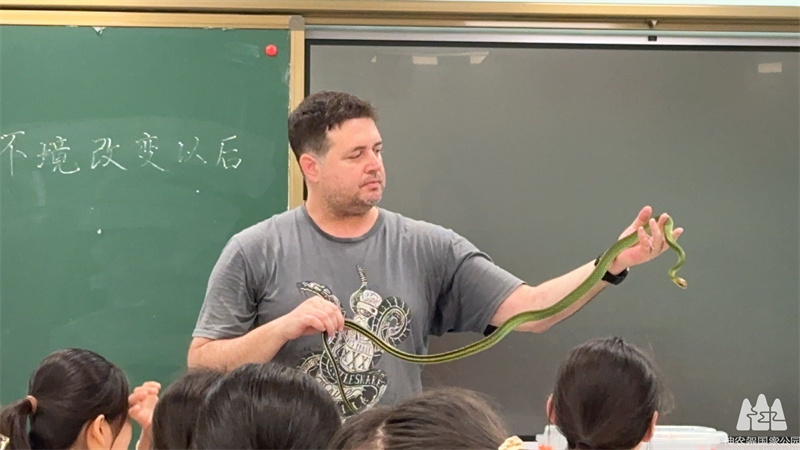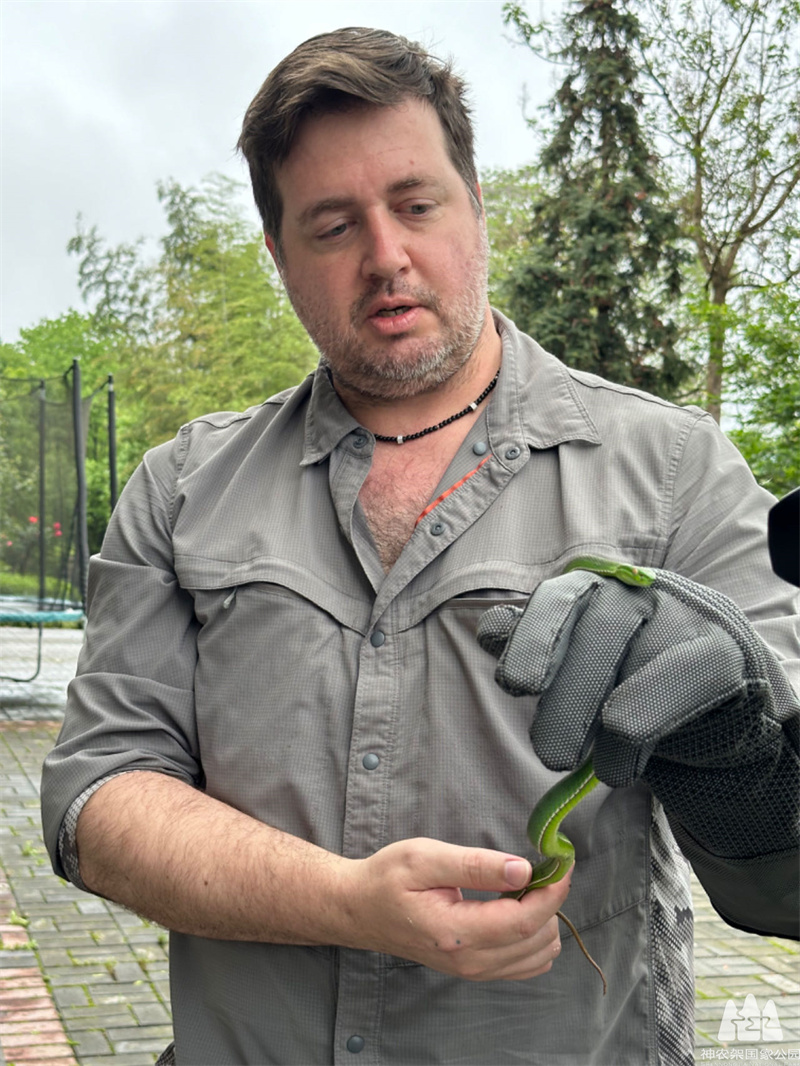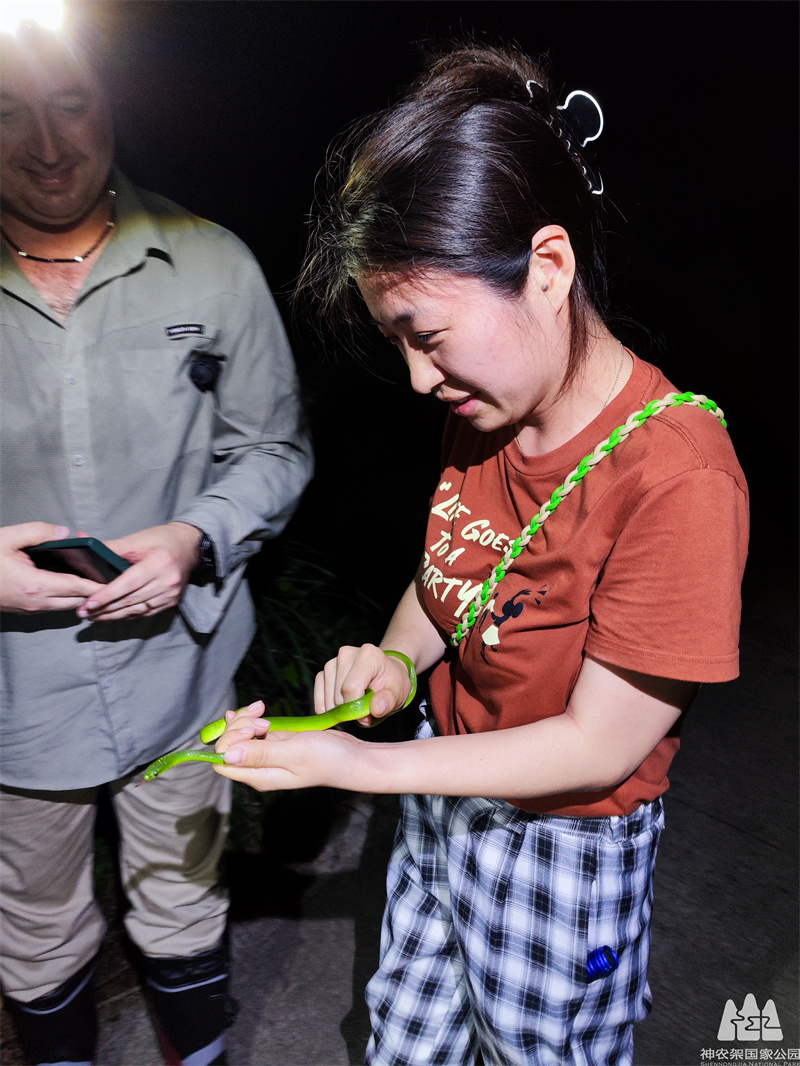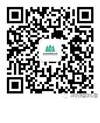Both beauty and the snake are acquired
Updated:2024-07-01 Source:Shennongjia National Park
On the morning of June 19th, Dr. Kevin Messenger, accompanied by his wife Li Yecheng and their friend Wang Qi, a coral expert from Guangxi University, attended the signing ceremony at Shennongjia National Park to officially appoint Dr. Messenger as a specialist in wildlife monitoring. In the afternoon, rather than venturing into the wild to search for snakes, they followed the arrangement of the CCTV production team for indoor shooting. Dr. Messenger held a snake in his hands and explained its habits while the CCTV staff filmed several shots.
 Kevin is explaining a Ptyas nigromarginata to the students in the classroom.
Kevin is explaining a Ptyas nigromarginata to the students in the classroom.I've known Dr. Messenger for two years. His team participated in the background resource survey of Shennongjia National Park, while our team was responsible for operating and maintaining the official website of Shennongjia National Park, which is how we met. We paid special attention to Dr. Messenger's team; among the groups involved in the survey team, only Nanjing Forestry University sent a foreign professor. Dr. Messenger has a deep affection for Shennongjia's amphibians and reptiles. Whenever he visits Shennongjia, no matter how late it is, he always goes into the wild to find snakes, frogs, toads, and salamanders, and often returns to the hotel after midnight.
 Kevin caught a Trimeresurus stejnegeri.
Kevin caught a Trimeresurus stejnegeri.As they were scheduled to return to Nanjing the next day, and Dr. Messenger had to return to the United States to attend an academic conference, I arranged a small gathering that evening in the Qixi private room at a famous restaurant. This June, we have met with Dr. Messenger and his wife twice, both times at the Qixi private room. The reason was that Qixi is a traditional Chinese festival for lovers, and as Dr. Messenger had just gotten married, we wished them a happy marriage.
During the meal, we talked a lot about Dr. Messenger's herping experience in Shennongjia. He was very honest, speaking straightforwardly without any concealment. Even when teasing questions were asked, he answered them seriously. I asked him, "You love snakes so much. Between your wife and snakes, who comes first in your heart?" He replied, "Before marriage, snakes came first. After marriage, my wife comes first, and snakes second." I asked him why he was so realistic. He joked that he needed his wife's permission to catch snakes. His seriousness amused everyone.
Li Yecheng's change in attitude towards snakes fully proves that the power of love and science can change everything. All over the world, there are very few women who are not afraid of snakes; those who love snakes, I wonder how many there are. I remembered Li Yecheng holding a small snake in her hand and playing with it. Suddenly, I thought of a question: Wasn't she afraid of snakes? So I asked her. "I was also afraid of snakes when I was young. Before March of this year, when Kevin occasionally brought snakes back, I was still scared. In March, I spent three days and two nights with Kevin herping in the wild, and Kevin helped me get over my fear. During that time, I held a Chinses green snake in my hand for the first time, feeling a bit numb at first, but gradually relaxed. After this experience, I am no longer particularly afraid of snakes," Li Yecheng said. "Kevin’s love for snakes and his dedication to his career are evident. To be honest, I admire his dedication to his job," she added.
 Li Yecheng held a snake in her arms fist time of her life.
Li Yecheng held a snake in her arms fist time of her life.Later, I met Dr. Shen Deming of Jiangxi Normal University's insect investigation team, who was also very familiar with Dr. Messenger. He told me that early on the 19th, Dr. Messenger returned to Nanjing only after releasing a bag of snakes he had previously caught at Yazikou.
Dr. Messenger first came to Shennongjia in 2006 and stayed for half a year on his first visit. Since then, he has often come and in 2012, he was bitten by a Protobothrops jerdonii in Shennongjia. This species is one of the more common venomous snakes, and though it is not deadly, a bite from one is not a pleasant experience. The bite Dr. Messenger received put him out of commission for about 2 days, which were spent in a hospital in Yichang. Dr. Messenger left the hospital on the 3rd day to attend a conference in Chengdu, and one week after this bite, Dr. Messenger was fully recovered and returned to Shennongjia to continue looking for snakes. Since then, his bond with the snakes of Shennongjia has been indestructible. As of the evening of June 18, 2024, Dr. Messenger had found 25 species of snakes in Shennongjia.
Dr. Messenger was hired by Shennongjia National Park as an expert. The Science Research Institute of Shennongjia National Park has a special connection with such a person and such a family. This not only demonstrates the Institute's desire for talent, but also its commitment to valuing and researching park resources. As mentioned by the park leadership during the signing ceremony, Dr. Messenger's joining will significantly advance the in-depth research on amphibians and reptiles at the Institute. This strengthens the research team at Shennongjia National Park focused on amphibians and reptiles and will greatly promote the park's science education efforts.
In my opinion, Dr. Messenger is already a representative of Shennongjia National Park. Perhaps in the future, he will become a symbol for foreigners in Shennongjia, much like the Irish plant hunter Augustine Henry. As maintainers of Shennongjia National Park's official website, we are honored to know Dr. Messenger, record his collaboration and contributions to Shennongjia National Park. (Written by Joseph Ma, Du Hua, Wang Pin) Copyright Shennongjia National Park
Address:36 Chulin Road, Muyu Town, Shennongjia Forestry District, Hubei Province 鄂ICP备18005077号-3
Address:36 Chulin Road, Muyu Town, Shennongjia Forestry District, Hubei Province 鄂ICP备18005077号-3
Email:2673990569@qq.com
Phone:0719-3453368
Phone:0719-3453368


TOP

